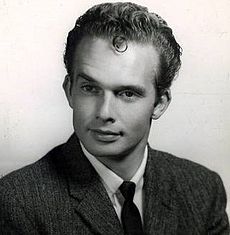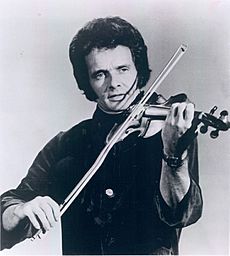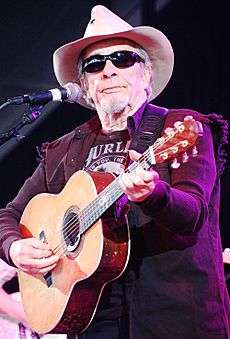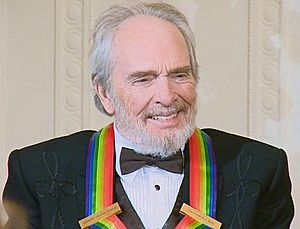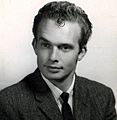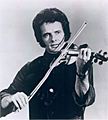Merle Haggard facts for kids
Quick facts for kids
Merle Haggard
|
|
|---|---|
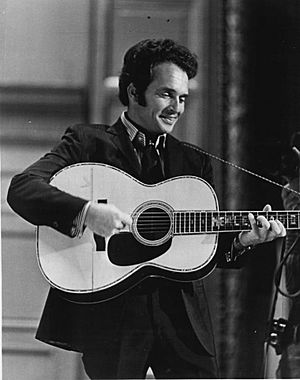
Haggard performing live in 1971
|
|
| Background information | |
| Birth name | Merle Ronald Haggard |
| Born | April 6, 1937 Oildale, California, U.S. |
| Died | April 6, 2016 (aged 79) Palo Cedro, California, U.S. |
| Genres |
|
| Occupation(s) | Singer, songwriter, musician |
| Instruments |
|
| Years active | 1963–2016 |
| Labels | |
Merle Ronald Haggard (April 6, 1937 – April 6, 2016) was a famous American country music singer, songwriter, guitarist, and fiddler. He was born in Oildale, California, during a tough time called the Great Depression.
Merle had a difficult childhood after his father passed away. He got into trouble many times when he was young. But after being released from San Quentin State Prison in 1960, he completely changed his life. He then started a very successful career in country music.
His songs were popular because they often talked about the lives of working-class people. Some of his songs even shared ideas that were different from the anti-Vietnam War feelings of other popular music at the time. From the 1960s to the 1980s, he had 38 songs that reached number one on the US country music charts. Many of these songs also appeared on the main Billboard Hot 100 chart. Merle kept releasing popular albums even into the 2000s.
He received many important awards for his music. These included a Kennedy Center Honors award in 2010 and a Grammy Lifetime Achievement Award in 2006. He was also added to the Country Music Hall of Fame and Museum in 1994. Merle Haggard passed away on his 79th birthday, April 6, 2016, after being sick with double pneumonia.
Contents
Merle Haggard's Early Life
Merle Haggard's parents were Flossie Mae and James Francis Haggard. His family moved to California from Oklahoma during the Great Depression. This was after their barn burned down in 1934.
They first lived in an apartment in Bakersfield. James, Merle's father, worked for the Santa Fe Railroad. A woman in Oildale, California, a nearby town, had an old boxcar. Merle's father turned this boxcar into a small house. The family then moved into it and bought the land. Merle Ronald Haggard was born there on April 6, 1937. Later, they added more rooms to their unique home.
In 1946, when Merle was nine, his father died from a brain bleed. This loss deeply affected Merle for the rest of his life. To support the family, his mother became a bookkeeper. Merle's older brother, Lowell, gave him a guitar when Merle was 12. Merle taught himself to play by listening to records by artists like Bob Wills and Hank Williams.
Merle started getting into trouble while his mother was at work. She sent him to a youth detention center for a weekend, hoping to help him. But his behavior did not get better.
Trouble and Turning Points
By age 13, Merle was involved in things like stealing. In 1950, he was caught shoplifting and sent to a youth detention center. The next year, he ran away to Texas with his friend Bob Teague. They traveled by riding freight trains and hitchhiked. When they came back, they were wrongly accused of robbery. They were released when the real robbers were found.
This experience did not change Merle much at first. He was sent back to a youth detention center later that year. He escaped again with his friend and went to Modesto, California. There, he worked many different jobs, like driving a potato truck and cooking. He first performed with Bob Teague in a Modesto bar, earning $5.
In 1951, he returned to Bakersfield and was arrested again for skipping school and small thefts. He was sent to a high-security youth center called the Preston School of Industry. He was released after 15 months but sent back after another incident. After his release, Merle and Teague saw a concert by Lefty Frizzell. Merle started singing along backstage. Frizzell heard him and insisted Merle sing first. Merle did, and the audience loved it. This moment made Merle want to pursue music. He sang in local bars at night and worked on farms or in oil fields during the day.
In 1957, facing money problems, he tried to rob a place in Bakersfield. He was caught and arrested. He was sent to the Bakersfield Jail. After trying to escape, he was moved to San Quentin Prison in 1958. While in prison, Merle learned that his wife was going to have another man's child. This made him very stressed. He lost several prison jobs and even planned to escape. But other inmates talked him out of it.
While at San Quentin, Merle met Caryl Chessman, another inmate. Also, the friend he planned to escape with, "Rabbit," did escape but was caught and faced serious consequences. Seeing these events made Merle want to change his life. He earned a high school diploma and kept a steady job in the prison. He also played in the prison's country music band. He was released on parole in 1960.
Years later, in 1972, after Merle became a country music star, California Governor Ronald Reagan officially forgave him for his past crimes.
Merle Haggard's Music Career
Starting His Music Journey
After leaving San Quentin in 1960, Merle first worked digging ditches. Soon, he was performing again and started recording with Tally Records. At this time, the "Bakersfield sound" was becoming popular. This sound was a simpler style of country music, different from the more produced "Nashville sound".
Merle's first song for Tally was not a big hit. In 1962, he heard Wynn Stewart's song "Sing a Sad Song" in Las Vegas. Merle asked to record it, and his version became a national hit in 1964. The next year, his song "(My Friends Are Gonna Be) Strangers" reached the top 10. This song was written by Liz Anderson, a talented songwriter. Merle's career was now truly taking off.
In 1967, Merle recorded "I'm a Lonesome Fugitive" with his band, The Strangers. This song, also written by Liz Anderson, became his first number-one hit. When the Andersons gave him the song, they didn't know about his time in prison. Merle's then-wife and backup singer, Bonnie Owens, said Merle was scared that someone from his past might call him out during a show. But this news did not hurt his career. People soon learned about his past, and it seemed to make his songs even more real.
The 1967 album Branded Man started a very successful period for Merle. His albums like Branded Man and Sing Me Back Home were considered some of the best of those years. Merle's band, The Strangers, played a big part in his sound. Roy Nichols on guitar, Ralph Mooney on steel guitar, and Bonnie Owens's harmony vocals were very important.
Merle's producer, Ken Nelson, gave him a lot of freedom in the studio. Merle said Nelson treated him with respect, which helped him create his best music. Nelson remembered that Merle's singing was so good, he sometimes forgot about the other musicians.
Towards the end of the 1960s, Merle wrote several more number-one hits. These included "Mama Tried," "The Legend of Bonnie and Clyde," and "Sing Me Back Home." Critics praised his songs for showing the struggles of working people. They said Merle truly lived the stories he sang about.
Popular Songs and Messages
In 1969, Merle and The Strangers released "Okie From Muskogee." This song seemed to show pride in being from Middle America. It talked about people who were patriotic and didn't question authority. President Richard Nixon liked the song and invited Merle to perform at the White House. Merle later gave different ideas about whether the song was a joke or a serious statement. He once called it a "documentation of the uneducated that lived in America at the time."
"Okie from Muskogee" became a huge hit. It was number one on the country charts for a month. It also reached number 41 on the main Billboard chart. This made it Merle's biggest hit at the time. It is often called his signature song.
His next song, "The Fightin' Side of Me," came out in 1970. In this song, Merle sang that he didn't mind people having different views. But he strongly said, "If you don't love it, leave it!" Merle had actually wanted to release a different song called "Irma Jackson" next. That song was about a romance between a white man and an African American woman. But his producer, Ken Nelson, advised him not to release it as a single.
"Okie From Muskogee" and "The Fightin' Side of Me" became anthems for the "Silent Majority". This was a term for people who felt their traditional values were being ignored. These songs are part of a trend of patriotic country music. Even though some people criticized Merle for these songs, he was popular with college students. His music was seen as part of an older country-folk style. Both "Okie" and "Fightin' Side" were played on underground radio stations. Even protest singers like Arlo Guthrie performed "Okie."
Later Success and Collaborations
In 1970, Merle released A Tribute to the Best ... Fiddle Player in the World. This album honored Bob Wills, a pioneer of western swing music. It helped bring western swing back into popularity. By this time, Merle was one of the most famous country singers. He had 24 number-one country songs since 1966.
In 1972, Merle starred in his first TV special, Let Me Tell You about A Song. It told his life story through music. His 1973 song "If We Make It Through December" became a hit during a tough economic time. It showed Merle as a voice for working people. Merle appeared on the cover of TIME magazine in 1974. He also wrote and sang the theme song for the TV show Movin' On, which was another number-one hit in 1975.
Throughout the 1970s, Merle and The Strangers continued to have many number-one country hits. These included "Grandma Harp" and "Always Wanting You." From 1973 to 1976, they had nine number-one hits in a row. In 1977, he moved to MCA Records. He started singing about themes like sadness and getting older. In 1980, Merle had a number-one hit called "Bar Room Buddies" with actor Clint Eastwood.
Merle also appeared in an episode of The Waltons TV show in 1976. He played a bandleader named Red. In 1981, Merle published his autobiography, Sing Me Back Home. He also changed record labels again, moving to Epic. He released the album Big City, which was highly praised.
From 1981 to 1985, Merle had 12 more top-10 country hits, with nine reaching number one. He also had two number-one duets. One was with George Jones called "Yesterdays' Wine" in 1982. The other was with Willie Nelson called "Pancho and Lefty" in 1983. Merle won a Grammy Award for Best Male Country Vocal Performance in 1984 for his song "That's The Way Love Goes."
Merle faced money problems into the 1990s. Newer country singers became more popular. His last number-one hit was "Twinkle, Twinkle Lucky Star" in 1988. In 1989, he recorded a song about flag burning. When his record label didn't want to release it, Merle left the label. He said he always liked to "fight the system."
Comeback and Final Years
In 2000, Merle made a comeback. He signed with an independent record label and released the album If I Could Only Fly. It received great reviews. In 2001, he released Roots, vol. 1, which had covers of songs by his heroes. He recorded this album in his living room with no extra sounds added. His bandmates, The Strangers, played on it.
In 2004, Merle talked on Larry King Live about his time in prison. He said it was "hell" and the "scariest experience of my life." Merle's hit song "Mama Tried" was featured in the 2003 movie Radio. His song "Swingin' Doors" was in the 2004 movie Crash (2004). And his 1981 hit "Big City" was in the movie Fargo.
In 2005, Merle released his album Chicago Wind. It included a song called "America First," which talked about the nation's economy and soldiers. In 2007, he released a bluegrass album called The Bluegrass Sessions.
Merle continued to perform and record until shortly before his death. In 2010, he released a new album, I Am What I Am. He performed the title song on The Tonight Show with Jay Leno in 2011.
Working with Other Musicians
Merle Haggard worked with many other artists throughout his career. In the early 1960s, he recorded duets with Bonnie Owens, who later became his wife. Their song "Just Between the Two of Us" was a minor hit. They recorded more duets even after their divorce. Merle also recorded duets with George Jones, Willie Nelson, and Clint Eastwood.
In 1970, Merle recorded his tribute album to Bob Wills. He brought together six members of Wills's band, the Texas Playboys. This album helped bring Wills back into the public eye and started a Western swing revival. Merle made other tribute albums to Bob Wills over the years.
In 1982, Merle recorded A Taste of Yesterday's Wine with George Jones. This album had two top-10 hits. They released another album together in 2006. Merle also released the duet album Pancho & Lefty with Willie Nelson in 1983. The title song was a huge hit. They released more albums together, including their last one, Django and Jimmie, in 2015.
In 2005, Merle sang on Gretchen Wilson's song "Politically Uncorrect." This song was nominated for a Grammy Award. He also sang on Eric Church's 2006 song "Pledge Allegiance to the Hag."
In 2017, Merle appeared with Willie Nelson in the documentary The American Epic Sessions. They performed a song Merle wrote for the film, "The Only Man Wilder Than Me." They also sang Bob Wills's "Old Fashioned Love." This was the last time the two performed on film.
Merle's very last recording was a song called "Kern River Blues." It talked about leaving Bakersfield and his thoughts on politicians. He recorded it in February 2016, and it was released in May 2016. His son Ben played guitar on the song.
Merle Haggard's Guitars
Merle Haggard was known for using Fender guitars. He even had his own special Fender Telecaster guitar model. This guitar was a modified Telecaster Thinline with unique features. He also played acoustic guitars. In 2001, C. F. Martin & Company made a special Merle Haggard Signature Edition acoustic guitar.
Merle Haggard's Family Life
Merle Haggard was married five times. His first marriage was to Leona Hobbs from 1956 to 1964. They had four children: Dana, Marty, Kelli, and Noel.
In 1965, he married singer Bonnie Owens. She had been married to Buck Owens before. Merle often said that Bonnie helped him become a big country music artist. He shared writing credit with her for his hit song "Today I Started Loving You Again." He said the song was about special feelings he had for her while they were touring. Bonnie also helped take care of Merle's children from his first marriage. Merle and Bonnie divorced in 1978, but they remained close friends. Bonnie continued to sing backup for him until she passed away in 2006.
Merle married Leona Williams in 1978, and they divorced in 1983. In 1985, he married Debbie Parret, and they divorced in 1991. His fifth wife was Theresa Ann Lane, whom he married on September 11, 1993. They had two children, Jenessa and Ben.
Health and Passing
In 1995, Merle had a procedure called angioplasty to clear blocked arteries. In November 2008, it was announced that he had lung cancer. He had surgery to remove part of his lung. Less than two months after his surgery, he was back performing. He continued to tour and record until shortly before he passed away.
In December 2015, Merle was treated in the hospital for pneumonia. He got better but had to cancel some concerts. In March 2016, he was hospitalized again. His concerts for April were canceled because of his ongoing double pneumonia. On the morning of April 6, 2016, his 79th birthday, Merle Haggard died from complications of pneumonia at his home in Palo Cedro, California. He was buried in a private funeral at his ranch on April 9, 2016. His long-time friend Marty Stuart led the service.
Merle Haggard's Legacy and Awards
Throughout his long career, Merle Haggard received many awards. These came from groups like the Academy of Country Music and the Country Music Association. He also won Grammy Awards. He was inducted into the Nashville Songwriters Hall of Fame in 1977. In 1994, he joined the Country Music Hall of Fame and Museum. He was also added to the Oklahoma Music Hall of Fame in 1997.
In 2006, he received a Grammy Lifetime Achievement Award. This award honors artists who have made lasting contributions to music. That same year, he was honored as a BMI Icon. By then, Merle had earned many BMI awards for his songs. His music had been played over 25 million times.
Merle Haggard received a Kennedy Center Honors award on December 4, 2010. This award recognizes artists for their great contributions to American culture. The next day, a special event honored him in Washington, D.C. Many famous musicians performed his songs, including Kris Kristofferson and Willie Nelson. This tribute was shown on TV.
In July 2007, a road in Oildale, California, where Merle grew up, was renamed Merle Haggard Drive. It stretches for three and a half miles. Merle played two concerts to help raise money for the new road signs. In 2015, the converted boxcar where the Haggard family lived was moved to the Kern County Museum. It was preserved for its historical importance.
In 2013, the mayor of Winchester, Virginia, gave Merle the Key to the City. Also in 2013, California State University, Bakersfield, gave Merle an honorary degree. He was recognized as a Doctor of Fine Arts. Merle simply said, "Thank you. It's nice to be noticed." In 2014, Merle performed his song "Okie from Muskogee" at the 56th Annual Grammy Awards. He sang with Kris Kristofferson, Willie Nelson, and Blake Shelton.
Merle Haggard's Influence on Music
Merle Haggard's guitar playing and singing style gave his country songs a strong, blues-like sound. He often said he didn't like modern country music. But he did praise artists like George Strait, Toby Keith, and Alan Jackson. Merle also loved jazz music. He once said he wanted to be remembered as "the greatest jazz guitar player in the world that loved to play country." Toby Keith has said Merle was a big influence on his own career.
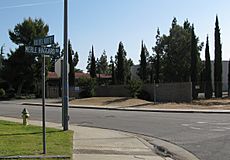
Many country music artists have honored Merle Haggard in their songs. Here are a few examples:
- Collin Raye's song "My Kind of Girl" includes the line: "How 'bout some music/She said have you got any Merle/That's when I knew she was my kind of girl."
- In 2005, Brooks & Dunn sang "Just Another Neon Night." The song says: "He's got an Eastwood grin and a Tulare swagger/Hollerin' turn off that rap/And play me some Haggard."
- Red Simpson mentioned Merle and Buck Owens in his 1971 song "I'm a Truck."
- Shooter Jennings mentioned Merle in his 2005 album title track Put the "O" Back in Country.
- Hank Williams III included Merle in his 2006 song "Country Heroes."
- LeAnn Rimes mentioned him in her 2013 song, "I Do Now": "Thank God for Merle Haggard, he's right, the bottle let me down."
- "You Never Even Called Me by My Name," sung by David Allan Coe, mentions Merle and his song "The Fightin' Side of Me."
- George Jones mentioned "The Okie from Muskogee" in his song "Who's Gonna Fill Their Shoes."
- Gretchen Wilson's "Politically Uncorrect" and Eric Church's "Pledge Allegiance To The Hag" both honored Merle. He even sang on these songs.
- David Nail's song "The Sound of a Million Dreams" mentions Merle's song "Mama Tried."
- John Anderson sang in "Honky Tonk Saturday Night": "I went to the jukebox and played some Merle Haggard/Oh me and the waitress think he's outta sight."
- Cody Johnson's song "Monday Morning Merle" focuses on Merle's music.
Some rock bands also responded to Merle's songs. The Youngbloods answered "Okie from Muskogee" with "Hippie from Olema." Nick Gravenites wrote "I'll Change Your Flat Tire, Merle" as a playful tribute. Even with these different views, the Grateful Dead performed Merle's songs "Mama Tried" and "Sing Me Back Home" many times.
The Southern rock band Lynyrd Skynyrd respectfully mentioned Merle in their song "Railroad Song." They sang: "Well I'm a ride this train Lord until I find out/What Jimmie Rodgers and the Hag was all about." Lynyrd Skynyrd also covered Merle's song "Honky Tonk Night Time Man." Merle saw himself as a student of music and life. He loved to discuss different topics, from jazz guitar to philosophy.
Images for kids
-
Merle Haggard Drive, Oildale, California
Awards
|
Academy of Country Music
BMI Awards
|
Country Music Hall of Fame and Museum
Nashville Songwriters Hall of Fame
|
See also
 In Spanish: Merle Haggard para niños
In Spanish: Merle Haggard para niños
 | Misty Copeland |
 | Raven Wilkinson |
 | Debra Austin |
 | Aesha Ash |


